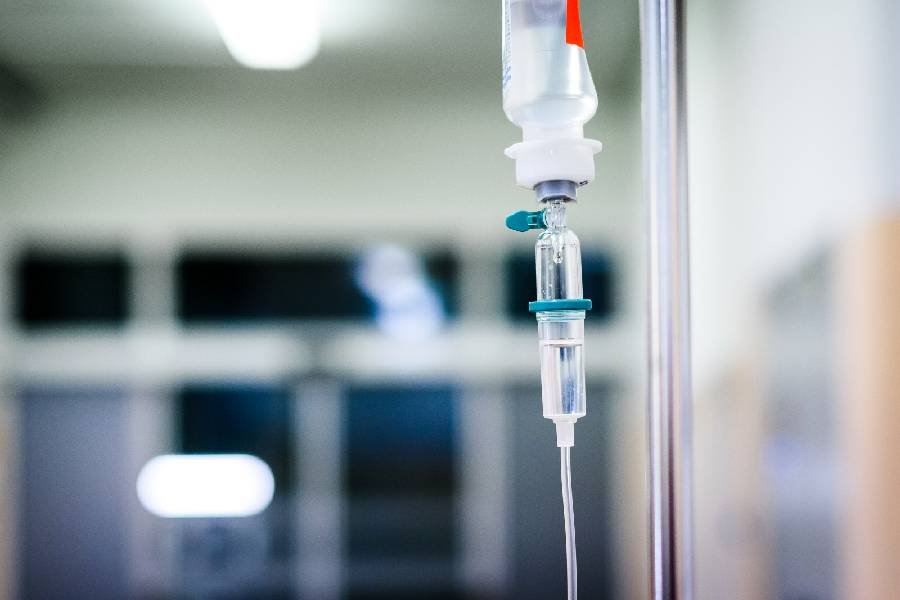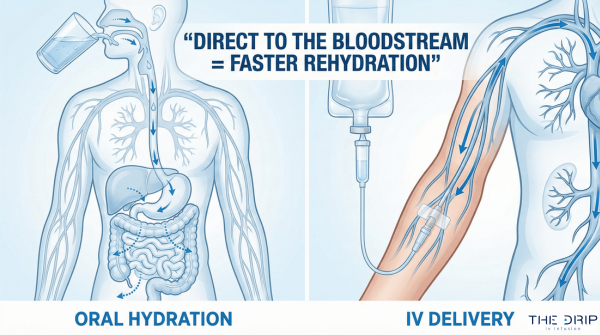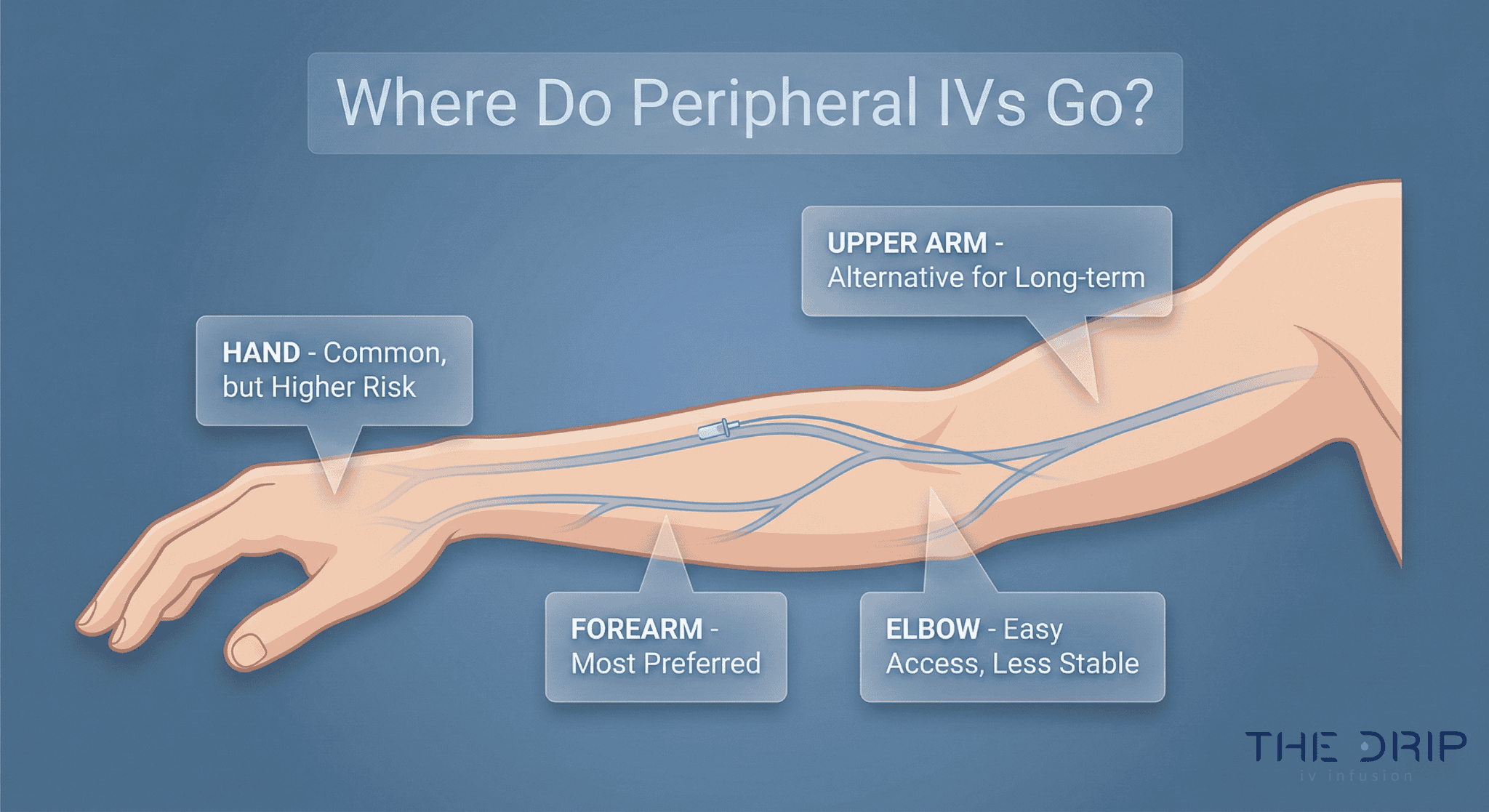IV therapy is quite common these days. Whether you need nutrients, fluids, or blood, this is an efficient way to bypass the digestive system and get the needed nutrients into your bloodstream. But what are the IV therapy benefits, and is it safe to use?
Stay tuned as we examine IV therapy uses, pros, cons, benefits, and more.
What Are IV Therapy Benefits?
One of the benefits of IV therapy is the efficient and fast effects of skipping the digestion process. Through this therapy, vitamins, minerals, and nutrients enter directly into the bloodstream. In that way, you might feel the benefits quicker, giving you more energy and improving general health.
With this kind of therapy, there are numerous advantages and benefits. These benefits depend on the health status of the patient, the number of treatments, and the treated condition. To that end, we’ll look at some of the benefits of IV therapy.
It may help in weight loss
IV therapy might help with healthy weight loss. This type of therapy uses lipotropic compounds that help burn fat, vitamins, and minerals.
Through a planned weight loss program that includes a healthy diet and exercise, this therapy is an excellent solution with which you may lose extra pounds more effectively.

Source: shutterstock.com / Photo Contributor: sheff
Improving athletic performance
Maintaining athletic performance is of great importance for those actively involved in sports. This therapy should help by hydrating the body, faster muscle recovery after a strenuous workout and expelling free radicals and toxins from the body.
In addition, IV therapy may provide the body with amino acids, a fundamental factor for improving muscle mass and its faster growth.
It may help treat nutrient deficiencies
Some people who are deficient in nutrients and have specific health problems may benefit from IV therapy. Since some patients can’t receive the nutrients through their diet, this therapy allows them to skip digesting the food in the digestive system.
Therefore, conditions such as cystic fibrosis, colon cancer, and short bowel syndrome may lead to a lack of vitamins, so IV therapy might be an excellent option.
Cardiovascular health support
One of the IV therapy benefits is the support of cardiovascular health. This therapy contains electrolytes and amino acids that work towards maintaining normal blood pressure and heart function.
One type of electrolyte is magnesium, which supports heart function. You should know that this therapy can’t be used against heart disease. However, it might help with regular exercise and a healthy diet.
Improving general health
IV treatment benefits include an improvement in general health. Namely, with the application of this kind of therapy, it is possible to improve both the physical and mental condition. IV therapy may help produce endorphins that allow you to relieve anxiety and cope with depression.
In addition, this type of therapy should help you by providing the necessary nutrients directly into your bloodstream so that you may get:
Reduced fatigue
Faster healing of wounds and muscle pain
Improving energy levels
Support of cognitive functions
Better immunity
IV drip benefits for skin and hair
In addition to hydration and getting the necessary nutrients, IV therapy might improve skin health. Namely, the vitamin IV therapy benefits may help your skin stay hydrated and fight external harmful agents.
Also, it might help deal with wrinkles and fight aging factors. Not only that, proteins, minerals, and vitamins, like B12 and B7, might contribute to improving the health of hair and nails. Some of these elements that are included in the therapy are:
Vitamin C
Amino acids
Biotin
Vitamin B12
Glutathione
What Conditions Require IV Therapy?
There are several cases where IV therapy can be used. For this purpose, we will mention only some of them, which are the most common and most used.
Hangover
The morning will likely be less pleasant if you’ve overdone it after a night out. Namely, you may wake up with a severe headache, dry mouth, and problems with the digestive system.
In addition, if you are older, this feeling may last throughout the day and usually prevent you from carrying out your daily tasks. Therefore, IV therapy after a night out might be beneficial. This kind of therapy might restore the energy you need, replenish lost nutrients, and flush out toxins.
If you opt for IV therapy, you might start feeling better in about 60 minutes. That way, you might effectively replace coffee, analgesics, and lying in bed.

Source: shutterstock.com / Photo Contributor: Motortion Films
Migraine
The cause of migraine is not fully understood. It is believed that the primary triggers are diet, stress, the environment, and some medications. If you are looking for pain relief, IV therapy may be an excellent solution.
This therapy includes magnesium, vitamins, and other medications that might help manage pain. The IV therapy lasts about 60 minutes, which will make you feel much better.
Flu and cold
IV therapy might also be used for cold and flu relief. If you’re feeling down and out from your flu symptoms, this therapy might get you back on your feet. IV therapy will help you stay hydrated; minerals and vitamins may help your immune system.
Not only that, but the composition of IV therapy may also deal with cold symptoms such as nausea, body aches, vomiting, and coughing.
Dehydration
Whether it’s a hangover or you’re exhausted after a workout, dehydration may cause many problems. These problems might be associated with headaches, body aches, exhaustion, and others.
If you find yourself in this situation, IV hydration therapy benefits include restoring the energy you need. Accordingly, this type of therapy consists of a combination of liquids, vitamins, and amino acids. Vitamins and amino acids may help you recover your tissues and increase energy levels, while fluids may help you rehydrate.
Morning sickness
Morning sickness is characteristic and typical during pregnancy. This condition is usually accompanied by symptoms like vomiting and problems with the digestive system.
Although the symptoms decrease as the pregnancy progresses, nausea might still cause problems and prevent you from performing your duties. Therefore, IV therapy may be one of the solutions that might help you get the nutrients you need and help you deal with nausea and vomiting.
This therapy consists of vitamins, minerals, and medicines.
Types of IV Therapy
IV therapy is commonly used in two ways: IV drip and IV push. In both ways, the contents of the therapy are injected directly into the patient’s bloodstream. However, the main difference between these two types of therapy is the amount of fluid received and the duration of the therapy.
IV drip
An IV drip is a type of IV therapy where a plastic catheter is used to inject the contents into a vein. Namely, this procedure involves a plastic catheter that is inserted into the vein with the help of a needle.
Once the catheter is in place, the needle is removed. This therapy usually lasts 45 to 60 minutes and injects about 250 to 1000ml of liquid into the vein. During this time, the patient can relax, watch TV, or read a book.
IV push
Specialists constantly monitor this type of therapy, which differs from IV drip in the amount of liquid injected.
In this therapy, the contents are administered into the vein through a previously placed catheter in the patient. The entire procedure lasts about 15 to 20 minutes, and about 30 to 60 ml of liquid is injected.

Source: shutterstock.com / Photo Contrubutor: Numstocker
Pros and Cons
As with any therapy, IV therapy has many advantages and disadvantages. Therefore, before deciding on this type of therapy, you should be well-informed about whether you are an ideal candidate for IV therapy. In addition, it is a good idea to talk to your doctor to find out if it is safe and if the advantages outweigh the disadvantages.
IV therapy pros
IV therapy has several advantages regarding the intake of the necessary substances, vitamins, and nutrients. The main advantage of this type of therapy is its quick action since the intravenous fluid is directly injected into the bloodstream.
In addition, there are additional advantages such as:
Bypassing the gastrointestinal system
Supplying the body with the necessary vitamins and minerals
It provides an alternative way of getting the necessary minerals and vitamins for those patients who can’t take them orally
It may help in the fight against diseases and the lack of certain ingredients in the body
It might increase energy levels
Promoting cardiovascular health
IV therapy cons
In addition to the above IV treatment benefits and advantages, there are also several disadvantages that you should be aware of. Namely, these deficiencies are pretty rare and usually occur if you don’t consult a doctor or professional.
High concentrations of certain vitamins may lead to health problems and problems with the kidneys and the heart due to the inability to process big amounts.
Complications may occur if you self-administer an IV fluid without a professional or doctor’s assistance.
Complications may occur if you are allergic to some of the ingredients in the IV fluid.
Who Can Use IV therapy?
In the past, IV therapy was administered only in healthcare facilities. Namely, this type of therapy was used for patients who had problems with dehydration, lack of nutrients, and other impaired health conditions.
Nowadays, IV therapy is widespread and quite popular, even among healthy individuals. This modern time brings a lot of stress, which contributes to weakening the immune system and the general state of health.
Therefore, IV therapy may be an ideal solution if you have a hangover, feel exhausted after physical work, or have cold or flu symptoms. With the help of this therapy, you might restore lost nutrients, rehydrate, and improve your immune system.

Source: shutterstock.com / Photo Contributor: Andrey_Popov
What You Should Tell Your Doctor Before Taking IV Therapy
Whether you are taking IV therapy in a health care facility or outside of it, consulting a doctor is something you must do. If you take the therapy in a healthcare facility, you have to state if you are allergic to any of the ingredients of the intravenous fluid.
In addition, you should emphasize if you are allergic to any substances, foods, or medicines.
You should also list all past and present illnesses. Taking prescribed therapy should also be taken with caution. Be aware that the ingredients of the intravenous fluid might react with the medications you are currently taking and impair your health.
Furthermore, if you receive regular therapy, do not stop or change it without consulting your doctor. These actions might negatively affect your health, and you might worsen the situation.
Where Can You Get IV Therapy?
In the past, hospitals and healthcare facilities were the only places where IV therapy was applied. Today, several facilities can provide you with this kind of therapy.
Hospitals
Patients who have an emergency or are being treated in a hospital are usually subjected to this type of therapy. In addition, IV therapy serves as an adjunct to an existing medical condition.
Medical spas
Medical spas are a place where you can relax through spas, massages, and IV therapy. Unlike hospitals, here, the staff is made up of health and non-health professionals. However, if you opt for IV therapy, it is administered by a healthcare professional.
At home
This type of therapy can also be used at home. However, keep in mind that this method might bring you certain complications. Therefore, if you opt for IV therapy at home, it is best to call a trained medical professional to administer the IV fluid successfully.

Source: shutterstock.com / Photo Contributor: Studio Romantic
IV bar
An IV bar or salon is a place where you can get the necessary vitamins, medications, and intravenous fluids. To that end, trained medical staff will ensure you get the IV therapy you need. In addition, some IV therapies are available remotely, allowing the doctor to bring the therapy you need to your office or home.
How Much Does IV Therapy Cost?
If you decide on IV therapy, remember that the price varies depending on the composition of the IV fluid and where you receive the therapy. In addition, most insurance companies don’t cover this type of treatment, so if you do get it, it can often be quite expensive.
However, you don’t have to do this treatment at all costs. To begin with, pay attention to your diet and healthy life and hydrate yourself enough during the day.
If you still decide on IV therapy, a consultation with your doctor is something you must do. After examining you, the doctor might tell you if you can receive this kind of therapy.
Conclusion
IV therapy is an effective way to administer nutrients, drugs, minerals, vitamins, and more directly into the bloodstream. In this way, it is possible to speed up the processes in the body and obtain the effects of the IV fluid in a relatively quick time.
However, if you are receiving this type of therapy, remember that you should consult your doctor. Although there are numerous IV therapy benefits, pay attention to the risks that follow if you administer this type of therapy yourself or hire a person who is not an expert.
At the very end, we hope we have helped you get the necessary information about IV therapy and all the details related to it.




